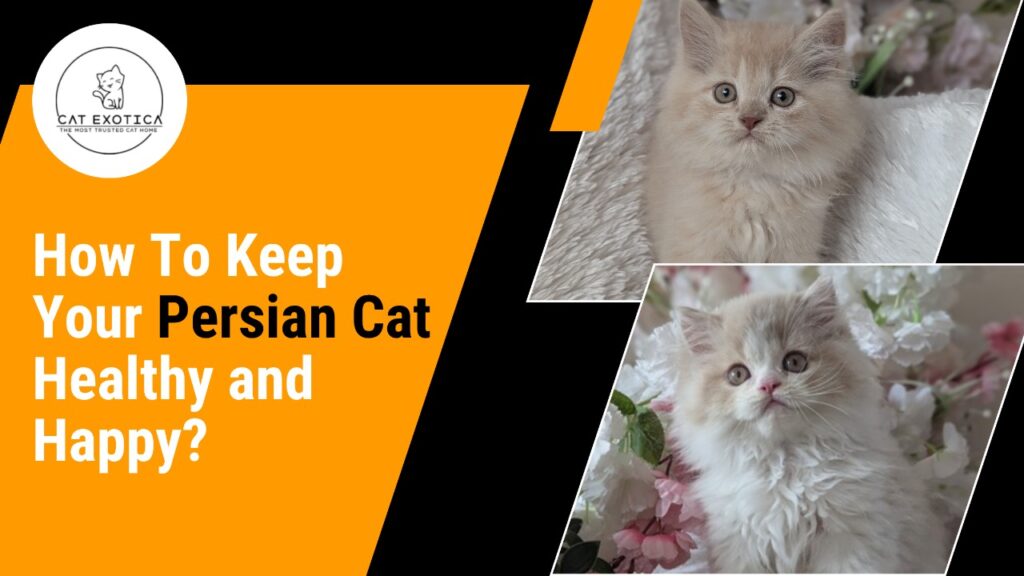Introduction
Persian cats are adored worldwide for their luxurious coats, gentle personalities, and royal demeanors. It is important to provide special care to these beautiful felines, known for their flat faces and expressive eyes, in order for them to remain healthy and happy. If you’re planning to buy Persian kittens, it’s important to be prepared for the responsibilities that come with owning this elegant breed. Unlike many other cats, Persians need a daily routine focused on grooming, health checkups, and a comfortable living environment especially in regions with warm or humid climates.

Understanding the Persian Cat's Unique Needs
Persian cats are a brachycephalic breed, which means they have a flat face and short nasal passages. While this gives them their trademark sweet look, it also makes them sensitive to certain respiratory and skin issues. If not cared for regularly, their thick, double-layered fur can become tangled and matted.
Because of their sensitivity to temperature and susceptibility to fur-related infections, Persian cats living in tropical climates like India require extra care. If you’re planning to buy Persian kittens, ensure your home has a cool, clean space where they can rest without stress.
Daily Grooming Is Non-Negotiable
The secret to a healthy Persian cat starts with grooming. Brushing your Persian’s coat every day helps prevent mats and reduces hairball formation. Start grooming while your cat is still a kitten to develop a positive association with brushing.
Use a wide-toothed steel comb to detangle the topcoat and undercoat, followed by a slick brush to remove loose hair. Always brush gently, following the direction of hair growth. Daily grooming not only keeps your cat looking beautiful but also prevents skin infections caused by trapped dirt and moisture.
If you miss multiple grooming sessions or struggle to detangle your mats, visiting a professional groomer is strongly recommended. They are trained in handling Persian fur and can also give your cat a hygienic trim during the warmer months.
Clean the Eyes and Face Regularly
Persian cats often experience tear staining because of their large, protruding eyes. Left unchecked, these stains can lead to bacterial infections and skin irritation. Wipe your Persian’s eyes daily with a clean, damp cloth, focusing on the folds near the nose and under the eyes. Avoid using tissues, as they can irritate the delicate skin.
Facial hygiene also involves wiping the nostrils and surrounding areas gently. Since Persian cats are prone to upper respiratory infections, keeping their faces clean and dry is essential. Regular cleaning helps reduce sneezing, watery eyes, and nasal blockages especially if you’re raising your cat in a dusty environment.
A Balanced Diet and Hydration Matter
Just like humans, cats thrive on proper nutrition. Persian cats need a protein-rich, low-fat diet with supplements that support their coat and skin health. Select a formula specially designed for long-haired breeds to minimize shedding and hairball issues.
If you’re planning to buy Persian kittens, consult a vet about the ideal food brands and portion sizes based on their age and weight. Always ensure your Persian cat drinks enough clean water throughout the day. Wet food or a cat water fountain can encourage hydration and support urinary health.
Prioritize Regular Health Checkups
Persian cats are genetically prone to certain conditions, including Hypertrophic Cardiomyopathy (HCM) and Polycystic Kidney Disease (PKD). While these conditions cannot always be prevented, early diagnosis can improve treatment effectiveness.
Visit your veterinarian at least twice a year for a complete checkup, including blood tests and cardiac evaluations. Look out for subtle changes in your cat’s behavior, such as loss of appetite, hiding more often, or labored breathing. Persians are naturally calm cats, so signs of illness may be harder to detect.
Vaccinations, dental care, and parasite prevention are also vital. A healthy Persian cat will have clear eyes, soft fur, and a playful yet relaxed demeanor.
Keep Your Cat Mentally and Physically Stimulated
Although Persian cats are more relaxed than other breeds, they still need mental stimulation to stay happy. Provide toys that challenge their minds and satisfy their hunting instincts, such as interactive feather wands or puzzle feeders.
A quiet, secure environment is ideal for Persians. Avoid loud noises or sudden disruptions, and always ensure they have a cozy spot where they can nap undisturbed. For first-time owners looking to buy Persian kittens, remember that creating a stress-free environment goes a long way to improving your pet’s overall well-being.
The Importance of Professional Grooming and Support
Even with daily grooming, your Persian cat will benefit from professional grooming every few months. Trained groomers can help with detangling stubborn knots, trimming nails, cleaning ears, and giving hygienic baths with cat-safe products.
If you’re new to grooming or facing challenges maintaining your cat’s coat, seek guidance from your vet or grooming specialist. Don’t hesitate to ask for demonstrations or product recommendations to make home grooming easier.
Conclusion
Keeping your Persian cat healthy and happy requires consistency, care, and a little patience. Begin building a grooming and healthcare routine as soon as you buy Persian kittens so they can grow up with positive habits. With daily brushing, a clean face, regular vet checkups, and lots of love, your Persian will thrive beautifully in any environment.
If you’re planning to buy Persian kittens, remember that a bit of extra effort each day will reward you with years of companionship, beauty, and purring affection.
